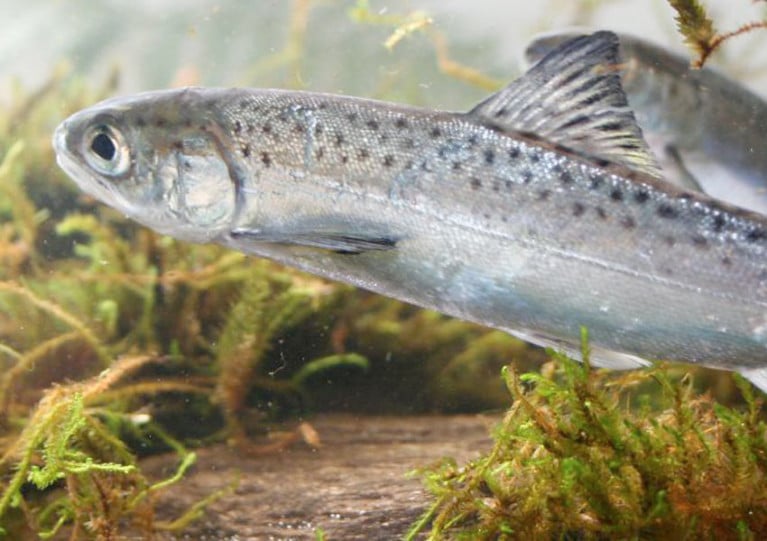Displaying items by tag: Salmon Ambassadors
More Than 200 New Salmon Ambassadors Graduate in 2022
More than 200 new Salmon Ambassadors have graduated as part of the Loughs Agency’s 2022 programme for primary schools in the Foyle and Carlingford river catchments.
The interactive, hands-on learning programme encouraged pupils to learn about their local river system and included various activities and topics such as salmon life cycles, migration, conservation, preservation, restoration and the role of the Loughs Agency.
This year’s programme culminated in an online conference showcasing the outstanding salmon projects carried out by each school since the beginning of February.
At the virtual event, pupils presented animations, videos, posters and works of art to their fellow Salmon Ambassadors across the participating schools, which this year were Broadbridge Primary School in Eglinton, Drumrane Primary School in Dungiven, St Columba’s Primary School in Newbuildings and Nazareth House Primary School, all in Co Derry; Scoil Naomh Lorcan in Omeath, Co Louth; St Mary’s National School in Stranorlar, Co Donegal; and St Patrick’s Primary School in Castlederg, Co Tyrone.
Each class focused on a particular life stage. Participants also had the opportunity to hear stories: a grandfather of one of the pupils was famous for catching the largest salmon ever recorded in the River Finn.
Pupils highlighted the habitats in which the fish live, the food they eat, the natural threats they face and the impact of human activities and waste on their health and survival.
Each class also had the opportunity to create a pledge to work towards in the future to continue conserving and protecting salmon populations and their surrounding environments.
As previously reported on Afloat.ie, the Loughs Agency initiated Salmon Ambassadors as part of 2019’s International Year of the Salmon to help connect young people to the array of incredible fish that inhabit the Foyle and Carlingford catchments.
The next Salmon Ambassador programme will commence in early 2023 and is targeted at primary- and national-school level, the Loughs Agency says.
‘Salmon Ambassador’ Programme Starts in Local Schools Throughout Foyle and Carlingford Catchments
The Loughs Agency’s education team is currently delivering this year’s Salmon Ambassador programme with primary schools and national schools in the Foyle and Carlingford catchments.
So far, pupils have been learning about the amazing lifecycle of the Salmon, from their early beginnings as tiny eggs right through to the adult stage.
During the Salmon Ambassador programme, which runs until May, pupils will learn about migration, habitat, pollution, food chains and how our changing climate impacts these incredible aquatic creatures.
As previously reported on Afloat.ie, the programme is a legacy of 2019’s International Year of the Salmon and sees the agency working with schools across both catchments to connect pupils with their local river habitats, and use the lifecycle of the salmon to teach them about the broader themes of biodiversity and ecology.
NI Primary School Pupils Become ‘Salmon Ambassadors’ For Loughs Agency
Last week the Loughs Agency visited local primary schools in the Foyle and Carlingford areas as part of the Salmon Ambassadors programme.
The programme, which forms part of the legacy of 2019’s International Year of the Salmon, will see the agency working with eight schools (six in Foyle and two in the Carlingford catchmen) to connect pupils with their local river habitats, and use the lifecycle of the salmon to teach them about the broader themes of biodiversity and ecology.
Loughs Agency education officer Michael Cosgrove said: “Through the Salmon Ambassadors we hope to create an informed generation that will value salmon as they should be valued and most importantly, value the environment we share with the ‘King of the Fish’.”
In their journey to becoming a Salmon Ambassador, pupils will learn about issues effecting the Atlantic salmon from local to global level and reflect upon how modern lifestyles have an impact on local wildlife.
Through a range of activities in class and on the banks of local rivers, pupils will be encouraged to take ownership of wild places and wild things so that they can be better conserved for future generations.
Allan Bogle, community engagement officer, said: “Wach school will also look after around 100 salmonid eggs until they hatch. This a participative education programme which is really hands-on so that each pupil can connect with the salmon and their local river.”
Over the next few months, 163 pupils will undertake a range of activities as they research the migration routes, threats and life cycle of the salmon, before presenting their findings and results at a salmon conference in June.
























































